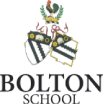.jpg?command_1=resize&width_1=220)
Returning former pupil Vicki Robinson delivered a fascinating Women of Work talk to Year 10 and Year 11 pupils at Bolton School Girls’ Division. Recapping her time at Bolton School, Vicki, now a Nuclear Chemist at BAE Systems, reflected: ‘At GCSE I liked Physics but once I started A Levels I discovered I really liked Chemistry. My favourite teachers were Mrs Walker, my Chemistry teacher, and Mrs Greenhalgh, my 3rd form or Year 7 form teacher.’ After Bolton, Vicki went on to study Chemistry at university, achieving a Masters before completing a PGCE and, later in life, a Nuclear Chemistry Course at HMS Sultan, Defence Academy of the UK.
Considering her work today, Vicki said: ‘I started as a Chemist in my current role nine years ago. My job involved taking various Chemistry samples from the submarine and analysing them using a multitude of different analytical techniques. I then progressed to Senior Chemist. This came with more responsibility, including people management. I started implementing changes to the department to improve how we worked. At this stage I became more heavily involved with radiochemistry and I started to become more specialised. Radiochemistry involves the use of a variety of techniques including gamma spectrometry and liquid scintillation, as well as analysis of alpha and beta emitters. It also involves the use of a variety of chemical techniques to prepare samples for analysis. I was promoted to Principal Chemist three years ago. I am now more focused on method development and improvement of our radiochemistry techniques, as well as developing our in-house training programme and mentoring new staff and apprentices.’
Vicki then went on to talk about how she ended up working in the field that she is in: ‘I didn't have an exact career in mind so for university I chose to study a subject I enjoyed rather than have a specific end point in mind. But I always knew I wanted to work in the defence sector and had an interest in nuclear, even whilst I was at school. Unfortunately, there weren't many opportunities then and nuclear was viewed as something to be avoided rather than promoted.
‘I joined the Army Reserves whilst I was at university and spent some time in Iraq on operations but I couldn't figure out what direction I wanted my career to take. I spent some time working in laboratory-based jobs but struggled to settle. I trained as a teacher and even though I enjoyed it, I just couldn't envisage myself still doing it in 20 years' time and so I walked away. I then decided to focus on what had always interested me and started looking specifically for defence industry jobs. Finding a nuclear chemist role available at the exact time I was looking felt like fate.’
Reflecting on her career change from teaching, Vicki said: ‘I didn't feel like I'd found my niche. Making the change was a leap of faith. I could have stayed in the role I was in until I found something else but it was much harder to look and devote myself to finding something else whilst still trying to do my job. So, I jumped. I made the decision and handed my notice in immediately. I second guessed myself a lot during my notice period as the thought of not having a job was terrifying. I'd been working since I was 15 and couldn't imagine not having one. I picked up some part-time work to give me an income so I could eat but gave me very little extra, which really helped me stay focussed on finding a new career. I was lucky that I made the decision before I had a family as I don't think I could have done it if there were other people depending on me. I found my job on a recruitment page two months later.’
Vicki, sharing her thoughts on who has inspired her, reflected: ‘I don't think there is any one person who has inspired me the most. My mum raised me to be independent and focussed me to have a career and I've always been grateful to her for that. It's helped me with the view that I can have a family and a career and I don't have to sacrifice either to succeed in the other.’
‘To be a scientist,’ Vicki said, ‘you need critical thinking skills with an analytical mind. Organisation skills are definitely an asset and adaptability and problem-solving are also useful as things can change quickly and you need to be able to adjust. Communication skills are important, especially for communicating scientific ideas and principles to people who don't have the same technical background as yourself. We work as a team, both internally within the department, and collaboratively with a wide range of other departments.’
Considering what she likes most about her job, Vicki concluded: ‘I'm at the stage of my career that I have quite a bit of autonomy. I plan my own workloads based upon priorities which means on a daily basis I can come in and choose what I want to do that day, obviously dependent upon deadline dates. This allows me to adjust depending upon how I'm feeling or where my focus lies. There are some days I will come in and bury myself in calculations, some days I'll be developing new methods for use and some days I can be sampling onboard the submarine. I love the urgency that accompanies some stages of the boat build programme where we are completely rushed off our feet and barely take time to catch our breath and then the lulls that follow where we tell our "war" stories and shared experiences.’
Addressing some of the biggest challenges of her role, Vicki advised that: ‘We are a reactive department and the workload as a whole is dependent upon the boat programme. This can be unpredictable at times and we have to adapt quickly to changes. This can make organising and planning the department tricky.’
Vicki said: ‘I am delighted to have found a career where I can still envision myself being in this role in 20 years' time. Having bounced through a few jobs before finding this one, I know how easy it can be to settle where you are because it's easy rather than take a leap. There are various projects I have worked on and changes that I have made that I am immensely proud of but none of those would have happened if I had not made the leap and followed my heart to begin with.’
Bolton School, Vicki reflected, had played a large part in her career success: ‘It gave me the education and academic support I needed. I was the first person in my family to go to university and I couldn't have done it without Bolton School and my family support. My family recognised that I was very academic at a young age and so when I started talking about going to Bolton School, my mum sorted it for me. At a time before the internet, I don't even know where she would have begun. My education at Bolton School was always focussed upon going to university and the expectation was set early on that I would. At a time when going to university was not the norm, particularly from my family, Bolton School set high expectations.’
Advising today’s Girls’ Division pupils on how they might enter BAE Systems, Vicki said: ‘Work hard and don't give up. There are a variety of entry routes whether it's by direct application, graduate schemes or apprenticeship scheme but a good education is essential. Once you have those qualifications, they are with you for life. If you want it, keep trying.’


















.jpg&command_2=resize&height_2=85)




.jpg)